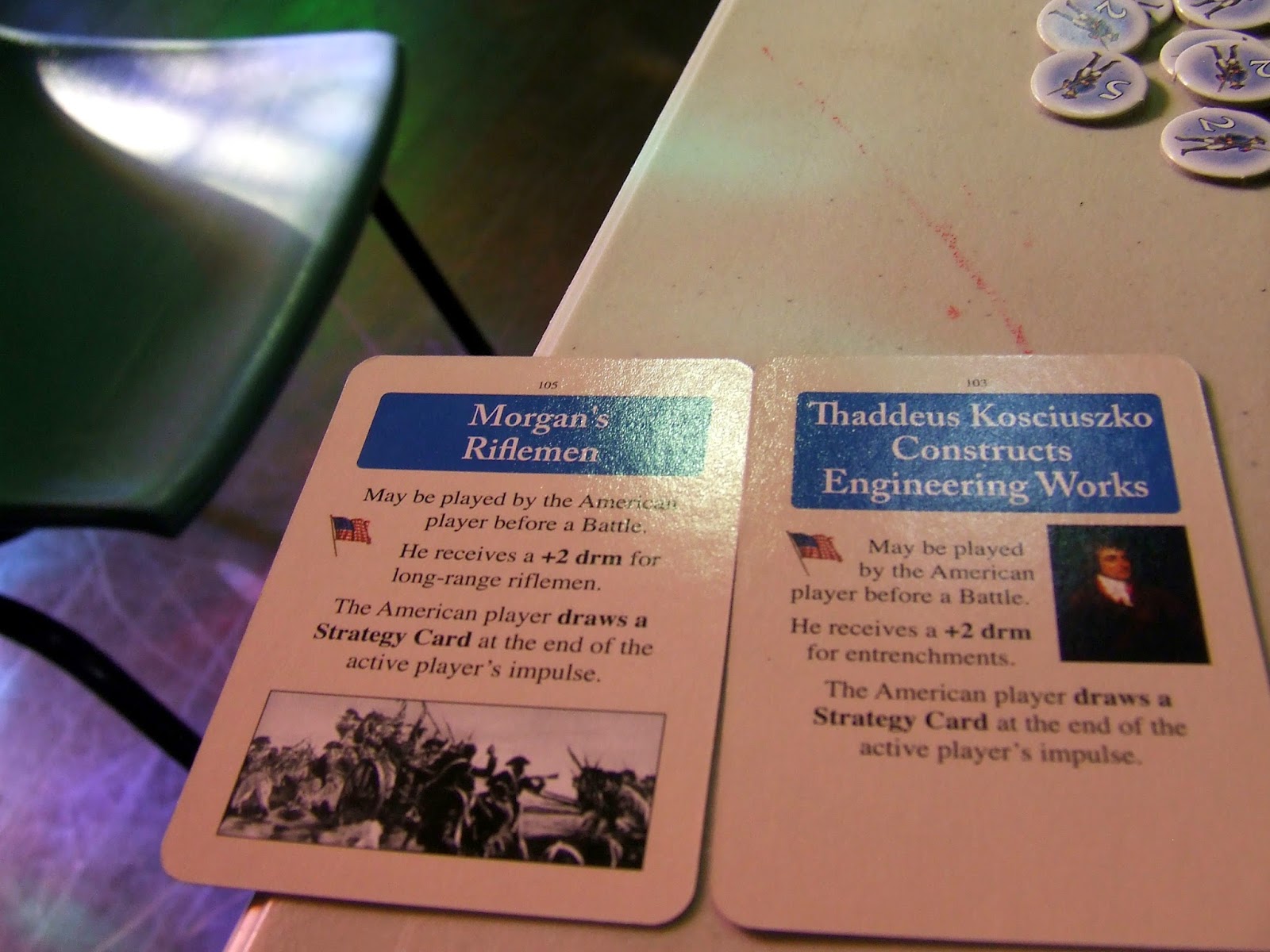September
Washington's War
2010
By
GMT Games
(Updated Oct 14)
Arnold of course is well served by biographers. There is "Arnold; American Hero" by
S Potter {2007 CUP} and the magisterial "Benedict Arnold' the classic two
volume work by Stomas {1987 OUP}. But
there is a gap in the market for a good one volume biography: Mr Potter’s book perhaps shows a historian
blinded by his admiration for his subject.Arnolds '
conduct in the Storming of Boston in May 1775 brought Arnold
to Washington ’s
notice, and he was promoted to Brigadier. Arnold was
instrumental in defeating of British forces the Virginia Campaign in 1776, and
the success of North Carolina
campaign as well.Arnold raised
new forces and went south to the aid of North
Carolina . On
his way there he was defeated at Petersburg
in March 1780, and his army defeated after the “Sternest fight I ever did serve
upon” as a British Veteran who had campaigned since the 45 wrote. Arnold
was mortally wounded leading a last Charge. Burgoyne refused to take his sword but his
surgeon could do nothing but ease Arnolds
passing.Arnolds ' views
on help from Spain and France
are also covered and Prof. Heard points out how his experience in the Seven Years
War perhaps led to his bias against seeking help from his old foes. Again French help was pursued and successfully
sought in the Second American Rebellion, and it was a major cause of success.Arnold ’s death
in battle spared him the fate of Washington, Jefferson and the other members of
the 'Noble Fifteen' whose trial in London and
executions were a major political error in reconciling a rebellious America .
GMT Games
(Updated Oct 14)
Book review;
Times Literary Supplement 2/10/14.
"Benedict
Arnold and the First American Rebellion"
Greg
Heard. 375 pages.
Maps. plates.
Index.
A book
from Prof Heard is always to be welcome .This Australian historian has carved
himself an enviable niche as a writer of well written popular military history.
Prof Heard writes for the non specialist.
Prof
Heard is also better at placing his subject in his world. To some extent this is something of a
"Life and times" book, but the title should tell you that. This is mainly about Arnold and his actions and influence in the
First American Rebellion.
He was
called even by his British foes 'The American Hector”. Arnold
never lost a battle but his last, and there he died of his wounds, and perhaps
despair for the cause he gave all he had for.
Prof
Heard takes us through Arnold ’s difficult
childhood with a spendthrift drunken father who squandered the family fortune,
and Arnold ’s
efforts to rebuild it. Wealth came his way,
first by his pharmacy and bookshop, then by investments in the West Indies trade. These enterprises bought Arnold like many another American trader into
conflict with the Navigation Acts He was
accused of smuggling but a sympathetic local jury acquitted him.
A veteran
of the Sevens Years War, Arnold
was instrumental in raising and equipping Connecticut Militia, paying out of
his own pocket. Arnold insisted on his troops being well
disciplined and the firmness of the Connecticut Line regiments in battle was
noticed by friend and foe. Arnold tried to spread
this discipline in the rest of the rebel forces, but without success. Indeed only when it was to late did American
forces have anything like the discipline of their foes, and is considered a
major reason for the Rebellions defeat. It
was of course rectified in the Second American Rebellion 1812-1815 which lead
to American victory and the independence of the fifteen colonies.
In the
Winter he made proposals to Congress about raising a Navy; though well thought
out they could not be carried out due to a lack of money. Arnold
raised a force of sloops, brigs and schooners to harass British shipping
locally and these ships helped in his greatest triumph.
At Norfolk in 1778 a major
British force under Burgoyne was defeated and forced to evacuate, leaving much
booty behind. The Royal Navy could not
be everywhere and was too busy fighting Arnolds '
little fleet to provide the usual support for the British incursion.
The Royal
Navy was a major reason for British victory; the Battle of Norfolk is a sign of
what could happen if the Americans ever gained a proper Fleet. But by now defeat was looking more obvious for
the Rebel forces. New
York had fallen, and Greens 'ill managed attempt to retake it was
a blow to the rebel’s hopes of retaking New England .
Arnold
had been suggested for that command and even submitted a plan, using the
artillery that Green neglected. It could
well have worked.
With
Washington and Green both defeated, British Armies under Cornwallis and a
vengeful Burgoyne invaded from Georgia and Virginia. Arnold defeated
Cornwallis and retook the Virginia state
capital Richmond
but most of his army melted way in the winter of Despair 1779/80.
When told
the news of North Carolinas agreement to the British terms Arnold said “it is better I die now than live
to see defeat.”
Burgoyne
had him buried with full military honours, and attended the funeral. Burgoyne
was confronted in a London
club by an indignant aristocrat about such respect for a Rebel and his reply
was cutting “This Rebel gave his fortune, his health and his life for his cause.
Tell me sir, what have you ever given
for anything?”
There is
a brief chapter about Arnold and his place in
the culture of the modern United Provinces of America , which could have been longer.
This apart, I can recommend this book to
anyone wanting a good biography on Benedict Arnold and I wait for Prof. Heard’s
next book with interest.








No comments:
Post a Comment